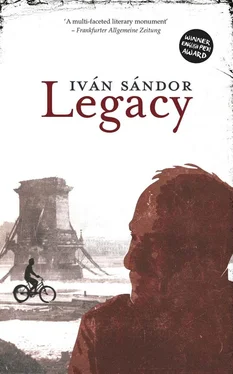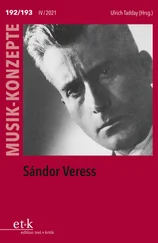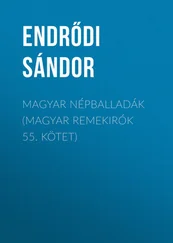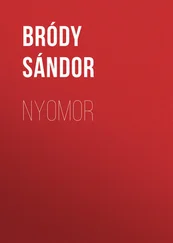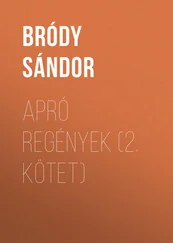Gertrud says she will tell her husband. Gizi should stay by the telephone; she will be called back very soon.
But you are OK, aren’t you, darling?
Never felt better.
You speak very good German, madam. The young woman finally gets some words out.
It seems to Gizi that she is calmer, possibly because she is not on her own. She explains that both she and her younger sister had a German governess. Our father took language skills very seriously and was always saying that without languages he would never have achieved what he achieved.
And what did he achieve?
He was a scholar.
Of the German language?
No, he was a classicist.
The typist said that Giselle was a pretty name, very exclusive. She laughs as she says the word exclusive. Gizi gets the feeling she is trying to prove that she is not unfamiliar with circles of that type, and she even asks if she has a younger sister with such a pretty name …
Erzsébet, but we all call her Bőzsi.
So where is Bőzsi now?
Gizi looks hard at the typist until she sees the terror reappearing on her features. She gets up and so does the young woman.
Gizi dials again and Gertrud picks up the telephone again. You’ll have to wait a bit. Carl is in conference with Signor Giorgio Perlasca — you know, the Italian who is pretending to be the Spanish Consul-General — and Mr Daniellson, the head of the Swedish mission, is also here. They are putting together some sort of statement.
Gizi tells the secretary that the Herr Vice-Consul had instructed her that she should get into the legation’s car and get over to him as soon as possible.
What about me?
You stay here. The building is under police protection. It will soon be at an end. Calm down!
Carl Lutz writes in his diary that evening:
The war has reached our house in Buda. All the windows of the British Embassy were smashed to bits by the detonations. For us the darkest period has commenced. For a start I instruct the men to clear away the shards of glass from the stairwell. My chauffeur Charles also sets to it. He has just arrived back from Szabadság Square, bringing that pretty blonde whose acquaintance we made in November. She is also helping. We fill one bucket after another with kilograms of glass fragments. Renewed explosions from near by. I order the women and children to take shelter in the cellar. Five policemen who were under orders to protect us had to lug carpets, upholstered furniture and a metal cupboard of food into the cellar. In case of emergency we also have to have access to a slop pail and a hand basin. The cellar was used to store wine, and the ceiling is reinforced concrete thirty-five centimetres thick.
He wants to be left alone in the room that has been set up as a study room. Gertrud and Gizi do not go down to the cellar, but Lutz asks his wife to leave him to himself. There is a mirror on the wall. The features he sees in that seem calm in contrast to his feelings. He places the thumb of his left hand on the pulse of his right hand, counts and measures a pulse of seventy-six, which also surprises him. Daniellson and Perlasca had been undaunted, conducting them selves like soldiers, he considered. Wallenberg was prudent, taking steps elegantly in even the most horrific situations. Lutz also envied his martial resoluteness and worldly aplomb. He inspects himself in the mirror. I’m just an ordinary official, he thinks; he sees his look behind the glasses as being expressionless, which makes him smile, and with the smile he looks more self-contented.
Gertrud comes in. Don’t be angry, darling, but Walter Rüfenacht, the consul in Vienna, is on the line and wants to have a word with you.
As it is three days since anyone from Switzerland made any enquiry Lutz is surprised that anyone is at all curious about him. He thanks the Viennese Consul for his interest and says that he is as well as can be expected under the circumstances, but Budapest is experiencing a terrible time, with armed Arrow Crossers who were allied to the Germans murdering by the thousand Jews, military deserters and anyone at all whom they regard as unreliable. He had received a message that assault groups were preparing to set the ghetto alight. Even the German military command opposed that, but he did not know whether it could be prevented. We are in God’s hands, says Walter Rüfenacht and hastily ends the call.
From the window Lutz can see that the city on the far bank of the Danube is alight. German tank columns can be tracked on the bridges that are still intact. He last paid a visit to Rüfenacht the previous year when he broke his journey back to Berne in Vienna. Walter used to compose poetry when he was young, he told Gertrud; he had become a superb official, but he always strove to turn the conversation on to art. Even with you, Gertrud had asked? Just imagine, even with me.
They had stood by the window in the consular office. Rüfenacht had shown him his bust of Lessing and said proudly, You see, Carl, German culture has given the world some great minds. Lutz had nodded, ashamed that all he knew of Lessing was just the name, he admitted, and you know, Walter, it has also given the world some great minds that were driven out of Germany. Rüfenacht had taken a newspaper out of a desk drawer. I understand who you are hinting at. Thomas Mann had declared that the age-old spirit of German art would help defeat the horror state that Germany had become.
Lutz is musing now that what had come to mind in Rüfenacht’s office was not Thomas Mann, even though he had read two of his novels in his younger days.
He can also see from his window the burning cupola of Western Railway Station.
He fishes out from a desk drawer a tube of liniment. He takes off his socks, loosens his necktie, unbuttons his shirt, leaving only his left arm sticking out while with his right hand he rubs the liniment on to his left shoulder. He had pulled a muscle when he helped carrying the buckets of glass shards. He sits down on the one and only chair. He pulls open the lowest drawer of the desk. The movement again reminds him of Walter Rüfenacht when he pulled out the newspaper he had hidden there. It may well have been an English paper, as a German one would most certainly not print a statement by Thomas Mann.
He spreads out a map on the table. A young man who worked in the Swiss Legation’s Department of Foreign Interests had sought him out during the weeks immediately following his arrival in Budapest. Not long after the man had unexpectedly been recalled to Zürich. On his farewell visit he had handed over a large envelope. In it was a map that he had drawn up, and he asked the Vice-Consul to study it if he got the time. Lutz had wanted to open the envelope straight away. No, not now, please, but wait a couple of days, he had said, because then I will no longer be in Budapest.
Is it an official report?
Oh no, Mr Vice-Consul! It’s an appendix from the dissertation I submitted to Zürich University.
A likeable fellow, quiet and modest, mused Lutz. I’m sorry you are leaving, he had said. A few days later he had opened the envelope. In fact, it had been a map of the countries of Europe. The USSR was a big red blot, the other countries in various colours. On each country was inscribed a year.
He read the text appended to the map then hid it in the lowest desk drawer. He was to take it out every so often in the years that followed, always taking care to close the door.
Various dates had been written on the territories of the countries of Europe, with countries bearing the same date being coloured similarly. The first group of countries were dated 1950; the second, 1960; the third, 1980, the fourth, 2000. The first group consisted of the USSR, Poland, Czechoslovakia, Yugoslavia and Bulgaria; the second the Baltic states, Romania and Hungary; the third the Nether lands, Belgium, France and Greece; the fourth the Scandi navian countries, the southern countries and the French and Italian parts of Switzerland.
Читать дальше
